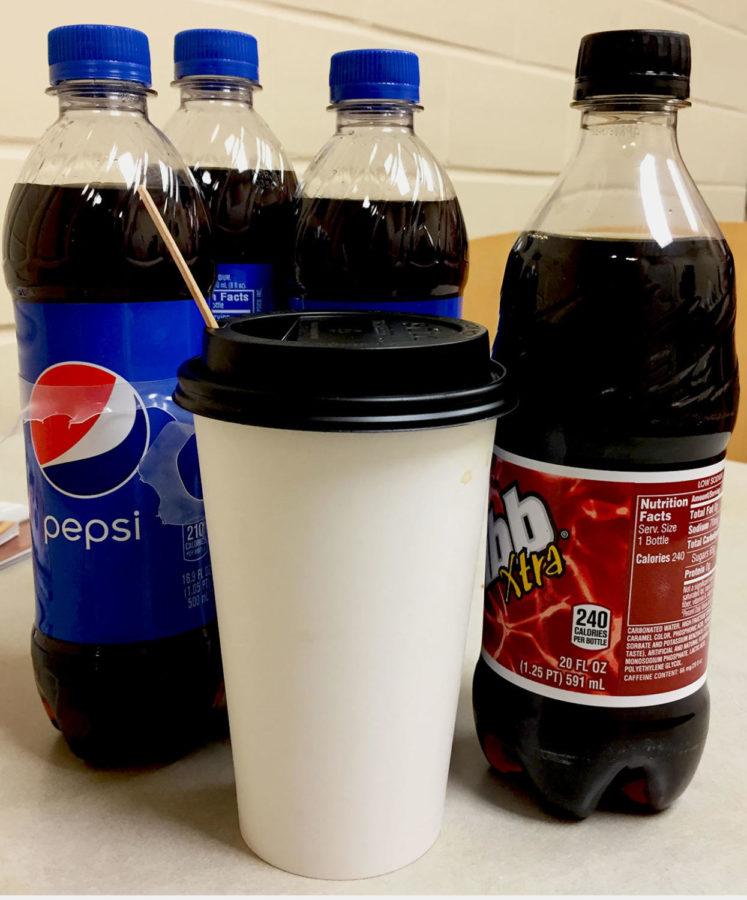Spilling the tea on caffeine
McKenzie Reimer/Iowa State Daily
Caffeine
February 28, 2019
Eighty-five percent of people in the United States consume at least one caffeinated beverage per day, according to a 2016 study done by the University of Washington. The U.S. Food and Drug Administration considers caffeine to be both a food additive and a drug.
Larisa Thys, a senior and software engineering major, drinks two cups of coffee each day. Before she turned 18, Thys was not allowed to have coffee in her household.
“It’s like a cool thing,” Thys said. “It’s sort of like the pre-alcohol beverage because people do so many things with it, and there are so many different varieties.”
According to Mayo Clinic, one caffeinated beverage is not considered harmful for a healthy adult. Adults should be able to safely consume up to four cups of brewed coffee, which is equivalent to the amount of caffeine found in 10 cans of cola or two “energy shot” drinks.
Ashley Friedow, a junior in apparel, merchandising and design, drinks at least one cup of coffee each morning.
“I’m usually really tired,” Friedow said. “I need a little pick me up to get going.”
The Alcohol and Drug Foundation, a foundation dedicated to preventing harm caused by alcohol and other drugs, said caffeine is a stimulant drug meant to speed up the messages traveling between the brain and body.
Rachel Schwartzbeck, a senior and animal ecology major, rarely drinks caffeinated beverages.
“I never felt the need to,” Schwartzbeck said. “Everyone always says they need it as a pick me up, to get up and out and to school and everything, but I’ve never really found myself in a place where I needed that.”
Going one day without caffeine or cutting down the amount consumed can have a variety of withdrawal effects for regular users, according to Mayo Clinic. Symptoms include headaches, fatigue, irritability and difficulty focusing on tasks.
“Caffeine affects everyone differently,” said the Alcohol and Drug Foundation website. “Effects may be experienced between 5 to 30 minutes after consuming caffeine and may continue for up to 12 hours.”
According to the Alcohol and Drug Foundation, regular, heavy use of caffeine also has effects on the consumer, including migraine headaches, insomnia, nervousness, irritability and restlessness.
Friedow said she had never heard about the symptoms associated with over caffeination or withdrawal before.
“I guess I’ve just never thought about it,” Friedow said
Instead of drinking caffeinated beverages, Schwartzbeck regularly drinks water. She recommends it for anyone wanting to cut down on caffeine.
“It just always makes you feel better when you have a bunch of water,” Schwartzbeck said.
Mayo Clinic recommends being mindful about the amount of caffeine being consumed daily. Small amounts should have little effect on the body but paying attention to labels and how much caffeine is in foods and beverages can help to moderate it.
For those interested in cutting back, Mayo Clinic suggests drinking one fewer can of soda or smaller cup of coffee each day, or drink decaf. Most decaffeinated beverages look and taste the same as their caffeinated counterparts.
“If I’m going to have a third cup, just because I do like coffee, I always try to do decaf,” Thys said. “Although, I know it’s not completely free of caffeine, it at least has a lot less.”
















